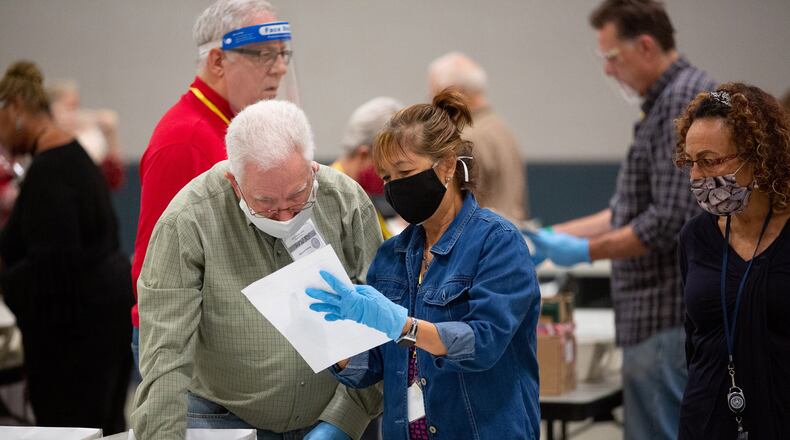Georgia began its third tally of votes in the presidential election Tuesday — a recount that is taxing the ability of some counties to juggle multiple election duties.
The recount commenced Tuesday morning in many of the state’s 159 counties. They have until midnight Dec. 2 to complete the task.
The recount is not expected to change the outcome of the election — Joe Biden defeated President Donald Trump by just 12,670 votes out of some 5 million ballots cast. State election officials say the latest tally likely will closely mirror the results of the initial count as well as the hand recount completed last week before the state certified the election.
Meanwhile, Gov. Brian Kemp renewed his call for an audit of voter signatures — an audit the secretary of state’s office sees no need for. And he repeated his support of the recount.
“I continue to stand with the president, and I support his decision to ensure that every legal vote is counted,” Kemp said at a press conference at the Georgia Capitol.
There has been no proof anything but legal votes have been counted in Georgia.
Trump requested the recount over the weekend, as he is entitled to do under state law because Biden’s margin of victory is by less than half a percent.
The recount comes as election officials in Georgia are preparing for a hotly contested Jan. 5 runoff election for two U.S. Senate seats that will determine which party controls the chamber beginning in January.
As of Monday, 762,000 people had already requested absentee ballots for the runoff — triple the number who voted absentee in the 2018 general election.
What’s more, some counties are also holding special elections next week. Fulton County, for example, will hold a special runoff election to fill the last few weeks of the unexpired term of U.S. Rep. John Lewis, who died in July, plus a runoff for state Senate District 39.
As if jugging those duties isn’t enough, Georgia’s biggest counties must count hundreds of thousands of ballots cast in the presidential election with a limited number of scanners.
Cobb County has eight scanners to process about 393,000 ballots. DeKalb County must scan some 373,000 ballots.
“We only have nine scanners available to use for this recount effort, so we are having to be creative with our staffing and resources,” DeKalb Elections Director Erica Hamilton said in a news release. “When you add in a pair of runoffs and a major holiday taking place at the same time, we are stretched thin to accomplish the recount by the designated timeline.”
Fulton County began logic and accuracy testing of its equipment Tuesday. But the counting won’t begin until Wednesday. After Thanksgiving, it will resume on Saturday.
Fulton will use about 50 workers and 13 scanners to count about 528,000 ballots.
Even as the recount began, Kemp renewed his call for an audit of signatures on ballot envelopes to ensure they match the voter signatures on registration documents. Such an audit could indicate whether there is evidence that local election workers improperly accepted ballots that should have been rejected because of mismatched signatures.
The secretary of state’s office says it’s not sure how such an audit would be done or who would pay for it. Without specific evidence of fraud, the agency sees no need for an audit.
The governor declined to answer when asked whether he knew of specific evidence of voter fraud that would justify an audit.
Staff writers Tyler Estep and Meris Lutz contributed to this article.
About the Author
The Latest
Featured




